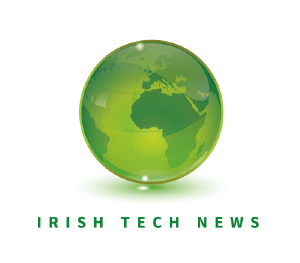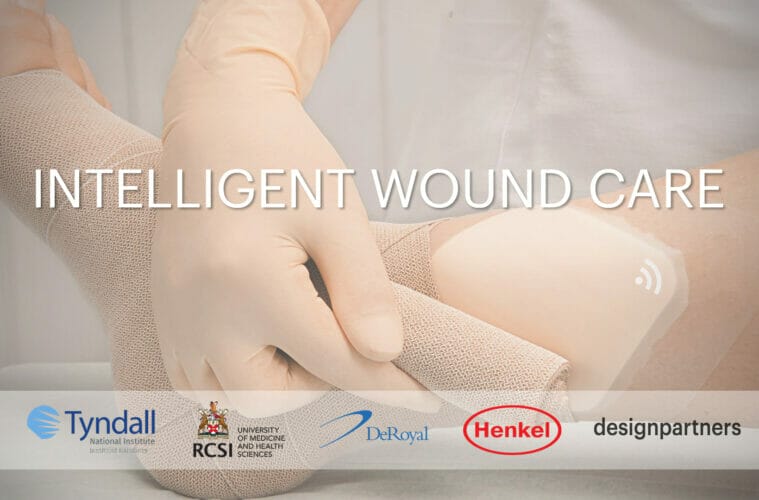Researchers from Tyndall National Institute at UCC; together with researchers
from RCSI, University of Medicine and Health Sciences; multinationals DeRoyal Global Healthcare Solutions and Henkel are launching a €1 million Enterprise Ireland Innovation Partnership collaboration to innovate the next generation of compression wound care therapy.
Irish Breakthrough in intelligent wound dressings
Non-healing chronic wounds effect more than 5% of us, with numbers rising due to growing elderly and diabetic populations. These wounds cause significant morbidity and mortality, leading to €12.5 billion in worldwide healthcare costs annually. In some regions of the world, a patient loses a diabetic foot to amputation every 12 seconds.
The consortium, supported by Bray design consultancy Design Partners, expects to significantly advance the treatment of non-healing chronic wounds through their joint ability to research, develop and deliver futuristic smart wound care technology with integrated intelligence and connectivity.
Modern care with compression therapy involves squeezing of the limbs using elastomeric bandages to reduce swelling and aid in the recovery of venous ulcers, deep vein thrombosis (DVT) and chronic ulcers. Treatment is a manual process that requires healthcare professionals to visually inspect compression bandages to ensure the correct pressure is maintained and to frequently re-dress bandages.
“We know it works but it’s hard to implement,” said Professor Zena Moore, Director of the Skin Wounds and Trauma (SWaT) Research Centre at the Royal College of Surgeons in Ireland. “There is an unmet clinical need to standardise the process and use technology to assist healthcare specialists. This partnership will improve clinical compliance and adherence through smart wound care and significantly improve patient outcomes.”
“Utilising Tyndall’s expertise in deep-tech ICT for Health and building on the Memorandum of Understanding (MoU) signed with RCSI in 2010, we plan to significantly advance the treatment and monitoring of compression wound care therapy,” said Carlo Webster, Senior Strategic Business Development Executive at Tyndall. “With the application of microelectronics, software and connectivity, the team expects to deliver a full end-to-end digital health solution that will radically
change how and where we manage compression wound care therapy in the future.”
“While wound care has advanced from a materials standpoint, it has not benefitted from deep-tech ICT solutions,” said Dr. Conor O’Mahony, Tyndall Principal Researcher and team lead in smart wound care. “Little has happened to merge current dressing materials with emerging microelectronic and wireless technologies.” To address this, O’Mahony has teamed with Dr. Brendan O’Flynn, Head of Tyndall’s Wireless Systems Network to expand the technology capabilities of the group.
“This unique consortium represents 10 years of relationship building between academia, clinicians and industry, as well as support from early funders including EU ECSEL,” explained Tyndall CEO Professor William Scanlon. “It brings together Tyndall’s deep-tech ICT for Health strategic programme, RCSI’s clinical validation, Henkel’s flexible electronics and materials, Design Partners’ design thinking, and the commercialisation drive provided by DeRoyal.”
“At DeRoyal, we know that working with partners like Tyndall and RCSI increases the resources at hand to lead in creating future solutions. Our combined efforts in developing an intelligent wound compression dressing therapy demonstrates the interconnected value between academic research, clinical industry and government funding,” added Mario Gaztambide, VP of International Sales and Marketing at DeRoyal Industries.
“Design Partners are excited to support this development program that will bring improved outcomes in the treatment of chronic wound care. Design Partners will support the depth of technical knowledge in the consortium with user centric design processes and human factors inputs,” said Eugene Canavan, Medical Design Director at Design Partners. “This program demonstrates the strong ecosystem of connected and digital health established and growing in Ireland.”
About Tyndall National Institute
Tyndall is a leading European research centre in integrated ICT (Information and Communications Technology) materials, devices and systems. It is one of Ireland’s five National Labs, specialising in both electronics and photonics. Tyndall works with industry and academia to transform research into products in its core market areas of electronics, communications, energy, health, agri-tech and the environment. With a network of over 200 industry partners and customers worldwide, they are
focused on delivering human and economic impact from excellence in research. A research flagship of University College Cork, Tyndall is home to a research community of 600 people of 52 nationalities.
Follow Tyndall National Institute on Twitter, LinkedIn and Instagram
About RCSI University of Medicine and Health Sciences
Ranked number one globally for Good Health and Well-being in the Times Higher Education (THE) University Impact Rankings 2020, RCSI University of Medicine and Health Sciences is an international not-for-profit university, with its headquarters in Dublin.
See more stories here.
More about Irish Tech News
Irish Tech News are Ireland’s No. 1 Online Tech Publication and often Ireland’s No.1 Tech Podcast too.
You can find hundreds of fantastic previous episodes and subscribe using whatever platform you like via our Anchor.fm page here: https://anchor.fm/irish-tech-news
If you’d like to be featured in an upcoming Podcast email us at [email protected] now to discuss.
Irish Tech News have a range of services available to help promote your business. Why not drop us a line at [email protected] now to find out more about how we can help you reach our audience.
You can also find and follow us on Twitter, LinkedIn, Facebook, Instagram, TikTok and Snapchat.

